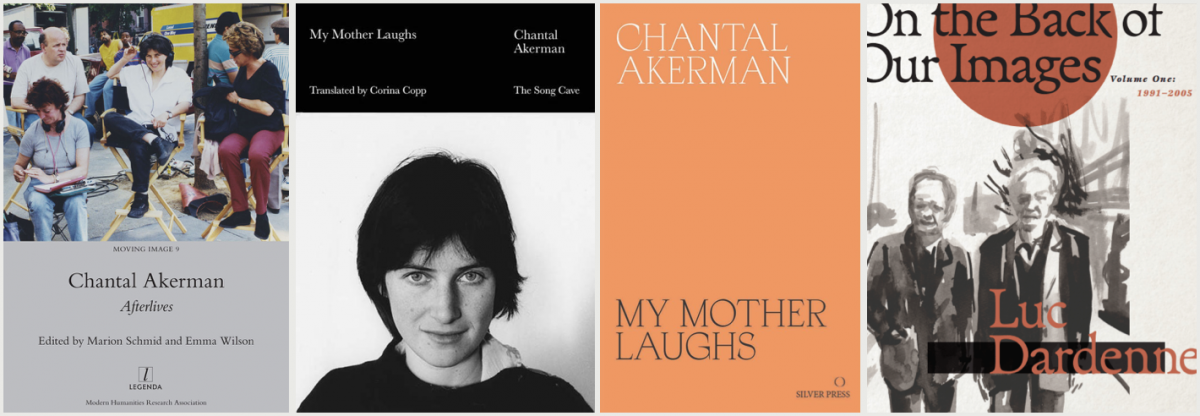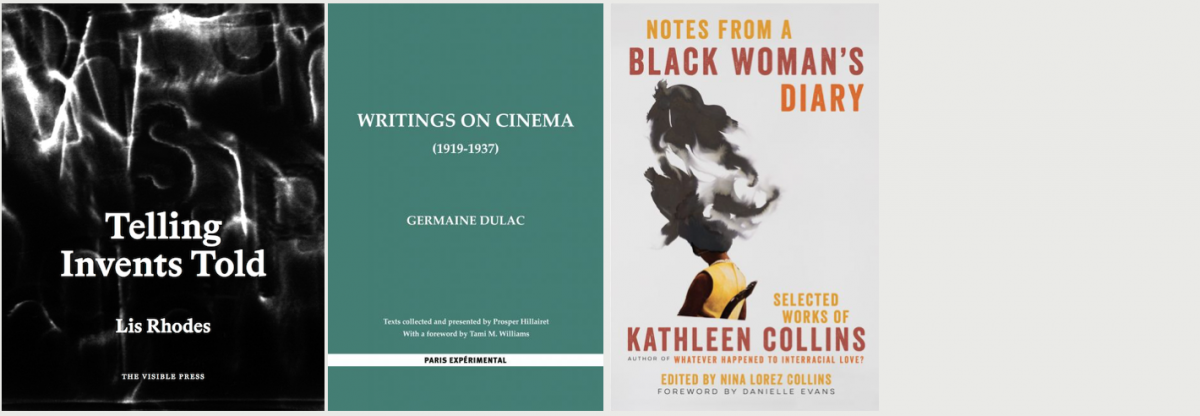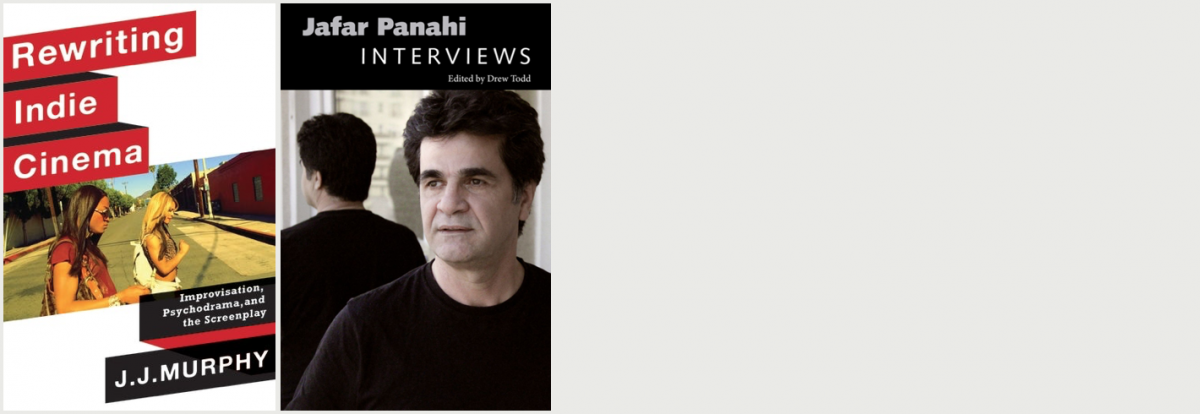New Book Releases / June 2019
If you would like to alert us to a recent or forthcoming film publication for the next round-up in winter, please contact us here. For notes on more books, see David Hudson’s monthly roundup at Criterion’s The Daily.
 At the end of April, a new book on Chantal Akerman has been published: Chantal Akerman: Afterlives. This one focuses on her works of the last two decades, a period during which she diversified her creative practice. From her documentaries “bordering on fiction” to her final installation, NOW (2015), the volume elucidates the thematic and aesthetic concerns of the later works, placing particular emphasis on self-portraiture, the exploration of intimacy, and the treatment of trauma, memory and exile. The publication contains a chapter by Belgian film scholars, Hilde D'haeyere and Steven Jacobs: “Real Estates: The Comedy of Spaces and Things in Chantal Akerman’s Demain on déménage.” You can find the complete table of contents on the website of the publisher, the Legenda book series of the Modern Humanities Research Association (MHRA).
At the end of April, a new book on Chantal Akerman has been published: Chantal Akerman: Afterlives. This one focuses on her works of the last two decades, a period during which she diversified her creative practice. From her documentaries “bordering on fiction” to her final installation, NOW (2015), the volume elucidates the thematic and aesthetic concerns of the later works, placing particular emphasis on self-portraiture, the exploration of intimacy, and the treatment of trauma, memory and exile. The publication contains a chapter by Belgian film scholars, Hilde D'haeyere and Steven Jacobs: “Real Estates: The Comedy of Spaces and Things in Chantal Akerman’s Demain on déménage.” You can find the complete table of contents on the website of the publisher, the Legenda book series of the Modern Humanities Research Association (MHRA).
Last month, Corina Copp's translation of Akerman's 2013 memoir, Ma mère rit [My Mother Laughs], became available for purchase. Babette Mangolte's 1976 portrait of Akerman graces the cover. There will be an official launch of the book on July 2 at Light Industry in New York. You can order the publication for only $20 on the website of the publisher, The Song Cave, which has secured rights for the U.S. Meanwhile, the memoir will be brought out in the UK in another translation by Daniella Shreir, editor of the feminist film journal Another Gaze. This edition is forthcoming in September but already available for pre-order on the website of the new London-based feminist publishing house Silver Press. On September 25 and 28, they’ll be launching the book with a mini-festival celebrating Akerman in collaboration with the programming collective A Nos Amours, including screenings, discussions and readings at King's College London, the Barbican, and in the independent bookshop, Pages Cheshire Street, with a conversation about translating Akerman’s voice, style, and artistic practice of translating women's lives onto the screen and page. You can find Sabzian's own collection of texts on and by Chantal Akerman here.
One more translation of a book by another Belgian filmmaker has just been published. On June 4, the first English translation of Luc Dardenne's On the Back of Our Images (1991-2005) was released. This journal, along with the shooting scripts of Le fils and L'enfant, was originally published as Au dos de nos images (1991-2005) by Editions du Seuil in 2005. It had already been translated into Spanish, Italian, Finish and Chinese. You can order the book directly from the website of the small Chicago-based publishing house Featherproof Books. They also plan to translate Au dos de nos images II (2005-2014) to offer the complete set collecting over 20 years of writing. Last year, Sabzian published a selection of fragments of Au dos de nos images in French and Dutch in a first and second part, along with an interview with Luc Dardenne (in French and Dutch) and a text (in French and Dutch) on the filmmakers’ aesthetics and politics.
 There’s an array of books by outstanding film critics coming up. First, later this month, arrives Manny Farber: Paintings & Writings. This collection combines Farber's table-top still lifes with previously uncollected samples of his art criticism, alongside film reviews, manuscript pages, school quizzes, and notes. Tributes and analyses are supplied by nearly two dozen contributors, including Farber’s partner and artist Patricia Patterson, filmmakers Olivier Assayas, Jean-Pierre Gorin, Chris Petit, Kelly Reichardt and Wim Wenders, but also critics such as Jonathan Rosenbaum and Luc Sante. You can read Kelly Reichardt's short essay from the book on the website of Film Comment. The book’s editors – film director Michael Almereyda, novelist Jonathan Lethem, and poet/biographer Robert Polito – also provide essays and additional commentary. The book comes on the heels of but is not a catalog of the exhibition “One Day at a Time: Manny Farber and Termite Art”, a cross between a Farber retrospective and a group show, which closed last March at The Museum of Contemporary Art (MOCA) in Los Angeles. The book is already on pre-sale on the website of Hat & Beard Press. You can find the table of contents here.
There’s an array of books by outstanding film critics coming up. First, later this month, arrives Manny Farber: Paintings & Writings. This collection combines Farber's table-top still lifes with previously uncollected samples of his art criticism, alongside film reviews, manuscript pages, school quizzes, and notes. Tributes and analyses are supplied by nearly two dozen contributors, including Farber’s partner and artist Patricia Patterson, filmmakers Olivier Assayas, Jean-Pierre Gorin, Chris Petit, Kelly Reichardt and Wim Wenders, but also critics such as Jonathan Rosenbaum and Luc Sante. You can read Kelly Reichardt's short essay from the book on the website of Film Comment. The book’s editors – film director Michael Almereyda, novelist Jonathan Lethem, and poet/biographer Robert Polito – also provide essays and additional commentary. The book comes on the heels of but is not a catalog of the exhibition “One Day at a Time: Manny Farber and Termite Art”, a cross between a Farber retrospective and a group show, which closed last March at The Museum of Contemporary Art (MOCA) in Los Angeles. The book is already on pre-sale on the website of Hat & Beard Press. You can find the table of contents here.
On July 2, J. Hoberman's new work of film and pop culture history, Make My Day: Movie Culture in the Age of Reagan, will be published. Hoberman was the Village Voice's film critic for over thirty years. The book chronicles the Reagan years, from the waning days of the Watergate scandal when disaster films like Earthquake ruled the box office to the nostalgia of feel-good movies like Rocky and Star Wars and Reagan's delirious 1984 re-election campaign and beyond. The period of Reagan’s ascendance brought such movie events as Jaws, Apocalypse Now, Blade Runner, Ghostbusters, Blue Velvet, and Back to the Future, as well as the birth of MTV. An exploration of the synergy between American politics and popular culture, Make My Day is the concluding volume of Hoberman’s ‘Found Illusions’ trilogy, including the detailed cultural histories, The Dream Life (2003) and An Army of Phantoms (2011), in which he already investigated the relationships between movies and American society in the 60s and the first decade of the Cold War, respectively. On the occasion of his new book, J. Hoberman curates a series of double bills surveying the '80s cinematic landscape in Film at Lincoln Center (August 23-September 2). You can find more information on where to order the publication, also available as e-book, on the website of the publisher, The New Press.
For many the publishing event of 2019 so far, Gilberto Perez's posthumous book, The Eloquent Screen: A Rhetoric of Film, will finally get its release by the end of July. Film critic, scholar and teacher Gilberto Perez (1943–2015) is the author of one of the best books ever written about film, The Material Ghost: Films and Their Medium (1998). In The Eloquent Screen, he makes a capstone statement on the powerful ways in which film acts on our minds and senses. Drawing on a lifetime’s worth of viewing and re-viewing, Perez invokes a dizzying array of masters past and present – including Chaplin, Ford, Kiarostami, Eisenstein, Malick, Mizoguchi, Haneke, Hitchcock, and Godard – to explore the transaction between filmmaker and audience. You can order the book on the website of the publisher, University of Minnesota Press.
 Another group of recent publications is formed by the collected writings of three different female filmmakers: Lis Rhodes, Germaine Dulac and Kathleen Collins. Just out is Telling Invents Told, the first anthology of writings by British artist and filmmaker Lis Rhodes, with texts dating from the 1970s to the present. It includes the influential essay ‘Whose History?’ (1978) alongside texts from works such as Light Reading (1978), together with new and previously unpublished materials. Since the 1970s, Rhodes has been making radical and experimental work that challenges hegemonic narratives and the power structures of language. Her writing addresses urgent political issues – from the refugee crisis to workers’ rights, police brutality, racial discrimination and homelessness – as well as film history and theory, from a feminist perspective. This collection is edited by María Palacios Cruz, co-founder of The Visible Press, deputy director of LUX and one of the programmers of Courtisane Festival. You can find the table of contents and order the book on the website of publishing house The Visible Press. The publication of Telling Invents Told coincides with the exhibition ‘Lis Rhodes: Dissident Lines’ (May to September 2019) at Nottingham Contemporary, where the official book launch will take place on July 6. For three consecutive Tuesdays in July, artist, writer and curator Lucy Reynolds will also lead a reading group at LUX Moving Image on and around Lis's writings.
Another group of recent publications is formed by the collected writings of three different female filmmakers: Lis Rhodes, Germaine Dulac and Kathleen Collins. Just out is Telling Invents Told, the first anthology of writings by British artist and filmmaker Lis Rhodes, with texts dating from the 1970s to the present. It includes the influential essay ‘Whose History?’ (1978) alongside texts from works such as Light Reading (1978), together with new and previously unpublished materials. Since the 1970s, Rhodes has been making radical and experimental work that challenges hegemonic narratives and the power structures of language. Her writing addresses urgent political issues – from the refugee crisis to workers’ rights, police brutality, racial discrimination and homelessness – as well as film history and theory, from a feminist perspective. This collection is edited by María Palacios Cruz, co-founder of The Visible Press, deputy director of LUX and one of the programmers of Courtisane Festival. You can find the table of contents and order the book on the website of publishing house The Visible Press. The publication of Telling Invents Told coincides with the exhibition ‘Lis Rhodes: Dissident Lines’ (May to September 2019) at Nottingham Contemporary, where the official book launch will take place on July 6. For three consecutive Tuesdays in July, artist, writer and curator Lucy Reynolds will also lead a reading group at LUX Moving Image on and around Lis's writings.
In our book note of last February, we made mention of the collected writings of Jean Epstein and Dziga Vertov, both filmmakers/theoreticians active in the '20s. One could add another collection to that list, Germaine Dulac: Writings on Cinema (1919-1937), which is out since the beginning of this year. The original 1994 edition, Écrits sur le cinéma (1919-1937), proved instrumental in the revival of Dulac's standing in world cinema history but has been long out-of-print. Her writings are now updated and made available in English for the first time, with a new preface by its original editor Prosper Hillairet that puts Dulac’s importance and current relevance into perspective. Germaine Dulac (La Coquille et le Clergyman,1927) is one of the major figures of the 1920s French avant-garde and silent cinema tout court, who bridged Impressionist and Surrealist cinema, ending her career with documentary films in the politically turbulent 1930s. She was also a powerful feminist with a non-conforming sexuality and a tireless activist in the defense of women’s rights. Writings on Cinema presents another side of her multi-faceted career as filmmaker and feminist: Dulac as writer, theoretician, and public speaker. The book brings together her principal texts, interviews, and speeches, where Dulac presents her concept of cinema. She argues for a cinema of liberation, of unbounded creativity, striving to define the inate qualities of the new art form around a key concept of the French avant-garde: cinema as motion. The publisher, Editions Paris Expérimental, made this new edition in French and English only available as an e-book to be purchased via Amazon.
Out since February, Notes from a Black Woman's Diary: Selected Works of Kathleen Collins is a collection of fiction, diary entries, screenplays, and scripts by the African-American artist, filmmaker and writer Kathleen Collins (1942-1988). Relatively unknown during her life, her film Losing Ground (1982) was rediscovered, restored, finally released to much acclaim in 2015 and part of this year's ‘Breaking Sacred Ground’ program at Courtisane Festival. Collins subsequently emerged on the literary scene in 2016 with the posthumous publication of the short story collection Whatever Happened to Interracial Love? The compilation of Selected Works is anchored by more of Collins’s short stories, which, striking and powerful in their brevity, reveal the ways in which relationships are both formed and come undone. Also collected here are Collins' diaries with her nascent ideas about race, gender, marriage, and motherhood, and the work she wrote for the screen and stage: the screenplay of Losing Ground, and the script for the play, The Brothers (1982). You can read a sample and order the book on the website of the publisher Ecco, an imprint of HarperCollins.
 Already available since April is Rewriting Indie Cinema: Improvisation, Psychodrama, and the Screenplay. Don't let the title or the cover fool you. In the book, J. J. Murphy, professor of film at the University of Wisconsin–Madison, explores alternatives to the fully prepared screenplay and how they have shaped American film from the 1950s to the present. He traces a strain of independent cinema that used improvisation and psychodrama, a form of improvised acting based on a performer’s own life experiences. Murphy begins in the 1950s and 1960s with John Cassavetes, Shirley Clarke, Barbara Loden, Charles Burnett, Andy Warhol, Jonas Mekas, a detailed study of William Greaves' Symbiopsychotaxiplasm (1968), and other independent directors who sought to create a new type of narrative cinema. In the twenty-first century, filmmakers such as Gus Van Sant and the Safdie brothers developed similar strategies, sometimes benefitting from the freedom of digital technology. Murphy pays special attention to Gus Van Sant, who made some films with varying degrees of improvisation: Gerry (2002), Elephant (2003), Last Days (2005) and Paranoid Park (2007). In reading key films and analyzing their techniques, Rewriting Indie Cinema demonstrates how divergence from the script has blurred the divide between fiction and nonfiction. David Bordwell called the book “an ambitious account of the changing role of improvisation in off-Hollywood cinema. What happens when filmmakers give up the screenplay? How do they construct a story, define characters, build performances?” You can find the table of contents, read the introduction and order the (e-)book on the website of the publisher, Columbia University Press.
Already available since April is Rewriting Indie Cinema: Improvisation, Psychodrama, and the Screenplay. Don't let the title or the cover fool you. In the book, J. J. Murphy, professor of film at the University of Wisconsin–Madison, explores alternatives to the fully prepared screenplay and how they have shaped American film from the 1950s to the present. He traces a strain of independent cinema that used improvisation and psychodrama, a form of improvised acting based on a performer’s own life experiences. Murphy begins in the 1950s and 1960s with John Cassavetes, Shirley Clarke, Barbara Loden, Charles Burnett, Andy Warhol, Jonas Mekas, a detailed study of William Greaves' Symbiopsychotaxiplasm (1968), and other independent directors who sought to create a new type of narrative cinema. In the twenty-first century, filmmakers such as Gus Van Sant and the Safdie brothers developed similar strategies, sometimes benefitting from the freedom of digital technology. Murphy pays special attention to Gus Van Sant, who made some films with varying degrees of improvisation: Gerry (2002), Elephant (2003), Last Days (2005) and Paranoid Park (2007). In reading key films and analyzing their techniques, Rewriting Indie Cinema demonstrates how divergence from the script has blurred the divide between fiction and nonfiction. David Bordwell called the book “an ambitious account of the changing role of improvisation in off-Hollywood cinema. What happens when filmmakers give up the screenplay? How do they construct a story, define characters, build performances?” You can find the table of contents, read the introduction and order the (e-)book on the website of the publisher, Columbia University Press.
Just out is Jafar Panahi: Interviews. In spite of multiple arrests, a brief imprisonment, and a ban on making movies and giving interviews, Panahi reveals his influences, politics, and filmmaking practices in this collection of twenty-five interviews, open letters, and his own court statement. Many of these documents have been translated from Persian and appear in English for the first time, including an interview done exclusively for this volume. You can order the book on the website of the publisher, University Press of Mississippi.
You can find an overview of all the ‘New Book Releases’ Notes here.

